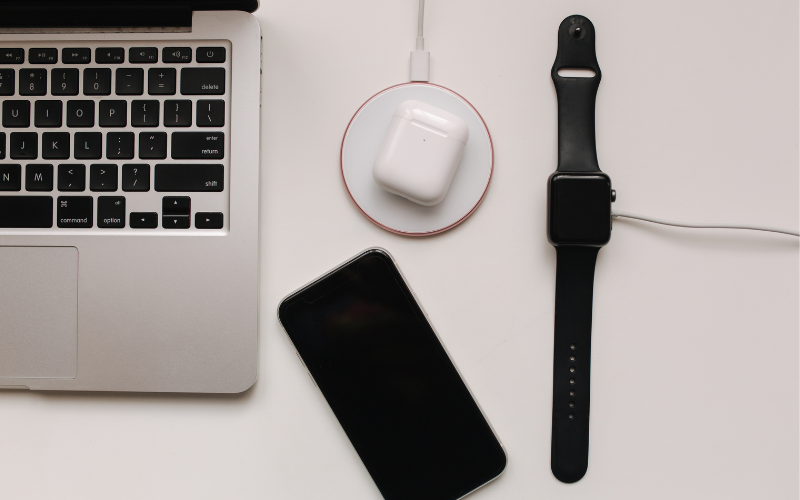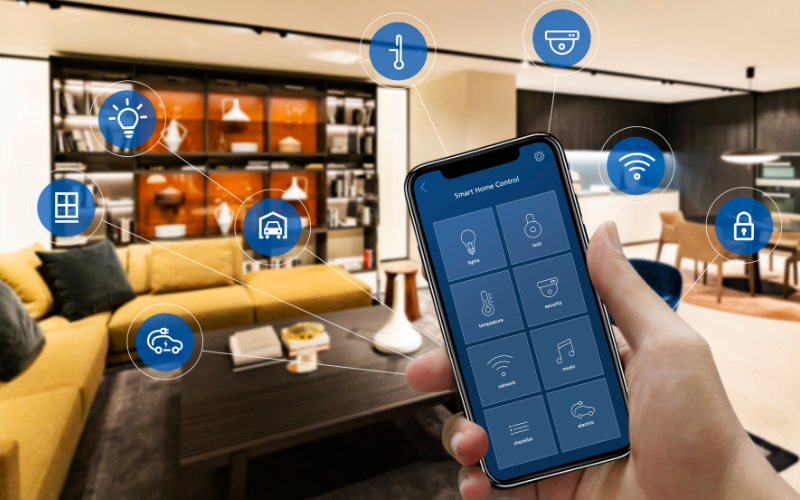Growing Prevalence of Smart Devices in Daily Lives

Smart devices have become increasingly prevalent in our daily lives. From smartphones to smart homes, these devices offer convenience, efficiency, and connectivity. With the rise of the Internet of Things (IoT), smart devices are becoming more interconnected, allowing for seamless integration and automation. Smartphones are perhaps the most ubiquitous smart device, providing access to a range of applications and services. Smartwatches and fitness trackers are also gaining popularity, offering health and wellness tracking capabilities.
Benefits And Risks Associated With Smart Devices

Examining the benefits and risks associated with smart devices is important because it allows individuals and organizations to make informed decisions about their use. Smart devices offer a range of benefits, such as convenience, efficiency, and connectivity, which can improve productivity and enhance the quality of life. However, there are also risks associated with the use of smart devices, such as privacy and security concerns, potential health risks, and the risk of addiction or over-reliance on technology.
Understanding Smart Devices

Smart devices are electronic devices that are capable of connecting to the internet and other devices to perform various tasks. These devices include smartphones, tablets, smartwatches, smart TVs, and smart home appliances such as thermostats, lighting systems, and security cameras. They use sensors, processors, and other advanced technologies to collect and analyze data, and then use this information to perform various functions.
Benefits of Smart Devices
Smart devices offer a wide range of benefits to users, including:
1. Convenience: Smart devices make life easier by automating various tasks and providing quick access to information and entertainment.
2. Efficiency: By collecting and analyzing data, smart devices can optimize energy usage, reduce waste, and improve overall efficiency.
3. Security: Smart home devices such as security cameras and smart locks provide added security and peace of mind to homeowners.
Risks of Smart Devices
While smart devices offer many benefits, they also come with some risks, including:
1. Privacy concerns: Smart devices often collect and store personal data, which can be vulnerable to hackers or other security breaches.
2. Compatibility issues: With so many different types of smart devices on the market, compatibility issues can arise when trying to connect and control multiple devices.
3. Dependence on technology: Relying too heavily on smart devices can make individuals less self-sufficient and potentially hinder their problem-solving skills.
Analyzing the Trade-Off: Benefits vs. Risks
Smart devices have become an integral part of our daily lives, offering convenience and efficiency in various aspects of our routines. However, as with any technology, there are both benefits and risks associated with their use. One of the main concerns with smart devices is the collection and storage of personal data. While this information can be used to improve the functionality of the devices and provide personalized experiences, it can also be vulnerable to security breaches and hacking. Users need to be aware of the privacy policies of the devices they use and take necessary precautions to protect their personal information.
Compatibility issues can also arise when attempting to connect and control multiple smart devices. With so many different types of devices on the market, it can be challenging to ensure that they are all compatible and can communicate with each other effectively. This can be frustrating for users and may require additional time and effort to troubleshoot.
Additionally, dependence on smart devices can potentially hinder problem-solving skills and self-sufficiency. Relying too heavily on technology to perform tasks and make decisions can limit an individual’s ability to think critically and develop problem-solving skills. Users need to balance the use of smart devices with other methods of problem-solving and decision-making.
Case Studies and Real-Life Examples
There are many case studies and real-life examples that demonstrate the benefits and drawbacks of using smart devices. For example, the use of smart home devices like thermostats and lighting systems can improve energy efficiency and save homeowners money on utility bills. However, these devices can also be vulnerable to hacking and can compromise the security of a home’s network.
Another example is the use of smartwatches and fitness trackers to monitor health and fitness. These devices can provide valuable data and insights to help individuals improve their physical health. However, relying solely on these devices can lead to a lack of motivation and accountability, as well as a potential over-reliance on data rather than personal intuition and experience.
Overall, it is important for individuals to carefully consider the benefits and drawbacks of using smart devices and to use them in a balanced and responsible manner.
Balancing Privacy and Convenience: Expert Opinions
Smart devices have become an integral part of our daily lives, providing convenience and ease of use. However, with the increasing use of these devices, privacy concerns have also risen. Experts suggest that individuals should be aware of the data that is being collected by these devices and take steps to protect their privacy. One way to maintain privacy while still enjoying the benefits of smart devices is to carefully read and understand the privacy policies of the devices and apps being used. Additionally, individuals can take steps such as using strong passwords and enabling two-factor authentication to further protect their personal information.
It is also important to consider the potential consequences of sharing personal data with third-party companies. While these companies may offer personalized recommendations and services based on the data collected, there is also a risk of the data being misused or sold to other companies.
Ultimately, individuals should weigh the convenience and benefits of using smart devices against the potential risks to their privacy and take steps to maintain a balance between the two.
Future Trends and Implications
Looking towards the future, it is clear that smart devices will continue to play a significant role in our daily lives. As technology advances, we can expect to see even more sophisticated and interconnected devices, with the ability to collect and analyze even more data about us. One potential trend is the increasing use of artificial intelligence (AI) in smart devices. This could lead to even more personalized and intuitive experiences, as devices learn from our behaviours and preferences over time.
FAQs
Are smart devices always collecting and sharing personal data?
Smart devices may collect and share personal data, depending on their features and settings. Users need to review privacy policies and settings to understand how their data is being used and take steps to protect their privacy if necessary.
How can I protect my privacy while using smart devices?
There are several steps you can take to protect your privacy while using smart devices:
1. Review the privacy policies and settings of your devices and apps to understand how your data is being collected and used.
2. Turn off features or settings that you don’t need or that collect unnecessary data.
3. Use strong, unique passwords for each device and app, and enable two-factor authentication when possible.
4. Keep your devices and apps up-to-date with the latest security patches and software updates.
Can smart devices be hacked remotely?

Yes, smart devices can be hacked remotely if they have vulnerabilities or weak security measures. Hackers can exploit these weaknesses to gain access to your devices and steal your personal information or control the device. That’s why it’s important to follow the tips mentioned above to protect your privacy and security while using smart devices.
Do manufacturers take privacy and security seriously?
It varies from manufacturer to manufacturer. Some take privacy and security very seriously and implement strong security measures in their devices, while others may prioritize convenience and feature over security. It’s important to research the manufacturer and their track record on privacy and security before purchasing a smart device. Additionally, reading reviews and checking for any reported security incidents can also provide insight into the manufacturer’s approach to security.
What are the potential long-term effects of widespread smart device adoption?
The widespread adoption of smart devices can have both positive and negative long-term effects. On the positive side, smart devices can make our lives more convenient and efficient, allowing us to automate tasks and control our environment with ease. They can also provide valuable data that can be used to improve our health, safety, and overall well-being. However, there are also potential negative long-term effects of widespread smart device adoption. One concern is the potential for increased surveillance and loss of privacy.
Conclusion
In conclusion, the future of smart devices is exciting and full of potential. With advancements in technology and the increasing use of AI, we can expect to see even more personalized and intuitive experiences from our devices.
